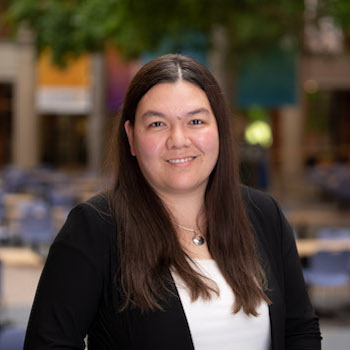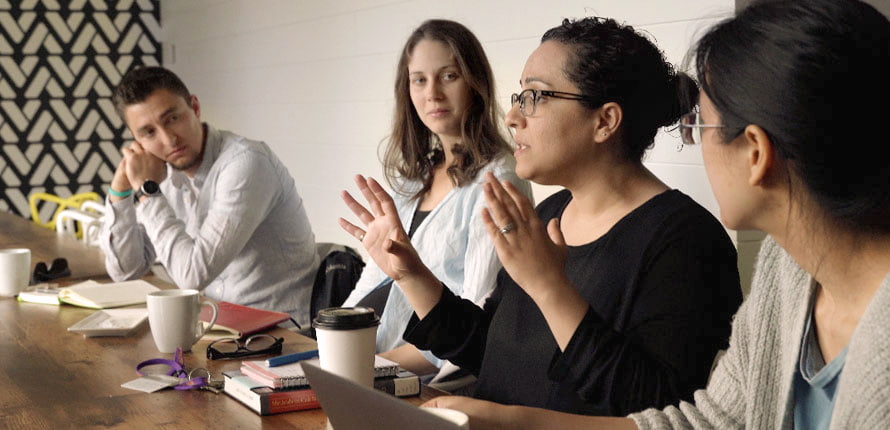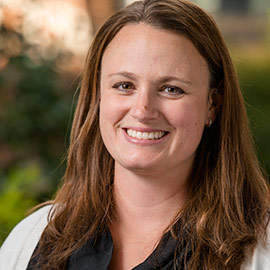Search for academic programs, residence, tours and events and more.
Are you ready to push the boundaries and expand our collective health knowledge? In Laurier’s Master of Science (MSc) in Health Sciences program, you will learn from interdisciplinary academics, immerse yourself in research and grow as a scientist and researcher. Focus your studies in one of two fields: Molecular and Medical Sciences (MMS) or Community Public and Population Health (CPPH). Each field offers a coursework or thesis option and is taught by an interdisciplinary group of research-intensive faculty. You will graduate prepared for research, policy and direct-service careers across the health sector.
Graduate ready for a variety of in-demand health and science careers.
Complete the MSc in as little as 10 months with the coursework option.
Study alongside world-class, award-winning researchers in the thesis option.
Students studying in the coursework option can complete the MSc, Health Sciences in ten months. This option features a comprehensive curriculum with a diverse array of courses that immerse you in timely and relevant issues within health sciences. Laurier has a unique cell to society approach that includes a focus on understanding how to integrate biomedical and social perspectives on health.
Students studying in the thesis option work closely with a Health Sciences faculty member and their team. This option has a strong emphasis on lab-based research, and you will choose your focus and conduct research with a faculty supervisor. Through this collaborative environment, you’ll refine your lab and research skills and generate data for your final thesis.
Choose to focus on a field of study that aligns with your education and professional goals. The Molecular and Medical Sciences (MMS) field explores health through a natural science lens. The Community Public and Population Health (CPPH) field examines health challenges through health and social science perspectives. Each field is available in the coursework or thesis option.
Both the coursework and thesis options offer diverse courses and experiences specific to your chosen field of study and are taught by interdisciplinary and research-intensive faculty. The education and experience you gain in both fields will allow you to integrate into your chosen health and science career.
The coursework option for both fields is normally completed in three academic terms (10 months) and requires the completion of 4.5 credits.
Molecular and Medical Sciences (MMS)
In the MMS field, you will explore molecular and cellular pathways related to human health, including the immune system, stem cell and regenerative medicine, and models of disease.
MMS coursework students must complete the following courses:
Students must also select up to two courses from the following:
A description of each course can be found in the Academic Calendar.
Community Public and Population Health (CPPH)
In the CPPH field, you will be involved in research that attends to real-world health problems and will be encouraged to develop skills in several areas. Faculty in this field focus on issues of health equity, social determinants of health, public health practice, health care access and population health and recognize that health problems are complex and require interdisciplinary solutions.
CPPH coursework students must complete the following courses:
Students must also select up to two courses from the following:
A description of each course can be found in the Academic Calendar.
The thesis option for both fields is normally completed in six academic terms (24 months).
Molecular and Medical Sciences (MMS)
In the MMS field, you will explore molecular and cellular pathways related to human health, including the immune system, stem cell and regenerative medicine, and models of disease.
MMS thesis students must complete the following courses:
A description of each course can be found in the Academic Calendar.
Community Public and Population Health (CPPH)
In the CPPH field, you will be involved in research that attends to real-world health problems and will be encouraged to develop skills in several areas. Faculty in this field focus on issues of health equity, social determinants of health, public health practice, health care access and population health and recognize that health problems are complex and require interdisciplinary solutions.
CPPH thesis students must complete the following courses:
A description of each course can be found in the Academic Calendar.
As you consider the next steps in your education, we want to support you along the way. Our emails have the updates, insights and information you need to make the decision that's best for you.
Take the first step in your graduate education and apply to one of our two Health Sciences streams: thesis and coursework. Follow our three-step admission process — we’ll walk you through how to apply, how to accept your offer and how to prepare for your first day as a graduate student.
MSc Health Sciences Application Deadlines
Both the thesis and coursework options are offered in a full-time format. Please see the table below for a list of application deadlines based on program option and entry term.
| Option | Start | Applications Open | Application Deadline | ||
|---|---|---|---|---|---|
| International Applicants | Domestic Applicants | ||||
| Thesis Option | Fall (September) |
March 16 (international applicants) July 31 (domestic applicants) |
March 15 |
March 15 (first consideration) July 30 (final application deadline) |
|
| Winter (January) |
July 16 (international applicants) Nov. 16 (domestic applicants) |
July 15 |
Nov. 15 | ||
| Spring (May) |
Nov. 16 (international applicants) March 16 (domestic applicants) |
Nov. 15 |
March 15 | ||
| Coursework Option |
Fall (September) |
October 2025 |
April 13 | July 30 | |
After you have submitted your OUAC application, paid the non-refundable application fee, and Laurier has received your application, you'll receive an email from gradadmissions@wlu.ca advising you to upload the additional required documentation to your application portal.
An application for admission to our Master of Science (MSc) in Health Sciences coursework program must include:
International Applicants
Tuition Deposits
As an international applicant, a tuition deposit is required after you have accepted your offer of admission to the Health Sciences program. Please do not pay your tuition deposit until you have accepted your offer.
Study Permits
If you have questions about the study permit application process, including questions about the updated financial requirements, you can connect with an International Student Advisor for a 1-on-1 meeting. You can also register to attend a monthly study permit application webinar.
After you have submitted your OUAC application, paid the non-refundable application fee, and Laurier has received your application, you'll receive an email from gradadmissions@wlu.ca advising you to upload the additional required documentation to Laurier’s Online Registration and Information System (LORIS).
An application for admission to our Master of Science (MSc) in Health Sciences program must include:
International Applicants
Tuition Deposits
As an international applicant, a tuition deposit is required after you have accepted your offer of admission to the Health Sciences program. Once you pay your tuition deposit, we will request a provincial attestation letter (PAL) on your behalf. Please do not pay your tuition deposit until you have accepted your offer.
Proficiency in written and spoken English is essential to graduate studies at Laurier. Applicants whose language of instruction during their previous postsecondary education was not English must submit evidence of proficiency in English.
Students applying to the coursework option who need to submit proof of English proficiency can submit their test scores through their applicant portal.
Students applying to the thesis option who need to submit proof of English proficiency can submit their test scores through LORIS.
Questions? Contact hegradadvising@wlu.ca.

"Students who want to link their passion for learning, research, and making community impacts will be mentored and trained to conduct impactful research by leading researchers in diverse and interdisciplinary health fields."
Melody Morton Ninomiya, Associate Professor, Health Sciences and Canada Research Chair (T2) in Community-Driven Knowledge Mobilization and Pathways to Wellness
Regardless of the type of graduate degree program you intend to pursue, financial planning is important. At Laurier, we want to provide you with as much information as possible about a variety of scholarship and funding opportunities and equip you with the skills to manage your finances effectively in the years to come.


"Hands-on experiences in internationally-recognized research labs in combination with an integrative seminar series will provide students with both depth and breadth in the field of health sciences."
Diane Gregory, Associate Professor, Kinesiology and Physical Education and Health Sciences
This program can lead to the following careers:
ASPIRE is with you every step of the way – from before you arrive on campus to graduation – with dedicated grad student support for community building, wellness education, skills development and career success.
Learn about the interests and ongoing research of our faculty members. If their research interests you, email the professor directly to set up a meeting. Include information about yourself, your skills, your experience, and why you’re interested in their research. If you are looking for more information about this program, have questions, or want to set up a meeting, contact a member of our team.
Stephanie DeWitte-Orr
Professor, Health Sciences and Biology
Associate Dean, Research and Graduate Studies, Faculty of Science
Diane Gregory
Associate Professor, Kinesiology and Physical Education and Health Sciences
Nirosha Murugan
Assistant Professor, Health Sciences
Sarah Poynter
Associate Professor, Health Sciences
Nicolas Rouleau
Assistant Professor, Health Sciences
Stewart Russell
Assistant Professor, Health Sciences
Anish K. Arora
Assistant Professor, Health Sciences
Todd Coleman
Associate Professor, Health Sciences
Rebecca Godderis
Associate Professor, Health Studies
Undergraduate Officer, Health Studies
Renee S. MacPhee
Associate Professor, Health Sciences and Kinesiology and Physical Education
Janet McLaughlin
Associate Professor, Health Studies
Melody Morton Ninomiya
Associate Professor, Health Sciences
Kate Rossiter
Associate Professor
Ketan Shankardass
Associate Professor, Health Sciences
Graduate Coordinator, Health Sciences
Robb Travers
Chair, Health Sciences
Professor, Health Sciences
Think this is the perfect program to continue your education?